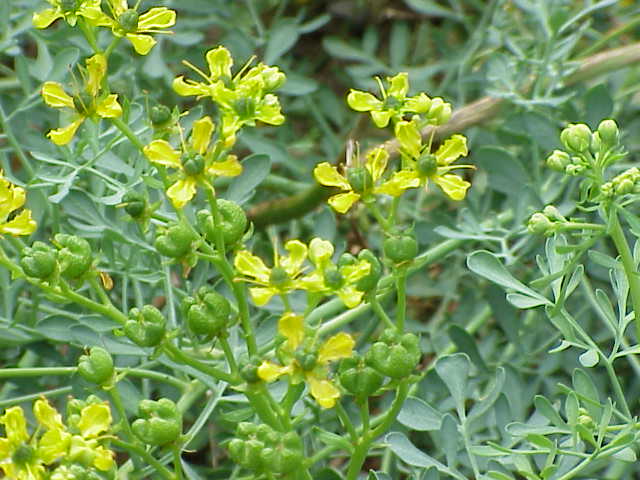
代代花属芸香科柑桔属植物。它绿叶婆娑,金果悬垂,是家养花卉中难得的佳品。代代果实初呈深绿色,成熟后显橙黄色,不脱落至翌年春夏又变成青绿色,故有“回青橙”之称。如养护得法,果实可宿存到第三年,故又名“代代”。
代代花原产中国浙江省。在北方只能盆栽,其花后结出橙黄色扁圆形的美丽果实,压满树枝,虽不可食,可在绿叶丛中留存树上数年,美观别致,是很受人们喜爱的庭院栽植或室内盆栽的优良花卉。
代代花又名回青橙、玳玳,香气浓郁,果实美观,是庭院和室内摆设的优美盆栽花卉,花和白兰、茉莉一样,可供窨制花茶,还可入药和提取香精。代代花属芸香科,为常绿灌木或小乔木,是酸橙的变种。叶革质,椭圆形,叶柄具宽翅。花洁白,单生或数朵簇生于叶腋,极芳香,花期5-6月,冬季果实呈橙黄色,挂满枝头,十分悦目。次年夏季果又变青,故有“回青橙”之美称。代代花的果实通常在植株上着生2-3年不落,隔年花果同存,犹如“三世同堂”因而得名代代,为重要的木本香花及观果植物。盆栽观赏,甚为清雅。
代代花原产中国浙江,现中国东南部诸省均有栽培。华北及长江流域中下游各地多盆栽。代代花性喜温暖湿润环境、喜光照、喜肥、稍耐寒(比荣莉、白兰耐寒性强)。在南方若有较好的小气候条件,可以露地越冬。盆栽在不结冰的室内即可越冬。对土壤要求不很严,在排水良好、肥沃疏松、富含有机质的微酸性砂质壤土中生长、开花、结果最好。
芸香屬(學名:Ruta),別名芸香草屬,原產於地中海地區、密克羅尼西亞和亞洲西南部,分佈於歐亞大陸及加那利群島,包含8-40種(因不同學者觀點而異)庭園小灌木,最主要的品種是芸香(R. graveolens),葉常綠,味道很苦,花則暗黃成簇。
芸香屬植物廣泛應用於古代中東飲食中,同時也常見於很多古羅馬時的食譜中(古羅馬著名食譜《Apicius》有記載),但因其味道很苦,並不適合大多數現代人的口味。不過,世界上有些地方仍在使用這種香料,如北非,而在義大利,芸香葉有時會被添加到渣釀白蘭地中以得到grappa alla ruta這種酒。
芸香葉幾世紀以來一直用作香料及藥物,可治療眼部疲勞和酸痛,內服可治療痙攣和月經疾病,也可作為墮胎藥、鎮靜劑和驅蟲劑[1]。不過採摘芸香葉時要小心,因為其中所含的揮髮油在陽光下如果接觸皮膚,會造成皮膚起水皰,而揮髮油亦會造成部分人胃痛、嘔吐、痙攣,甚至危及性命[2]。


